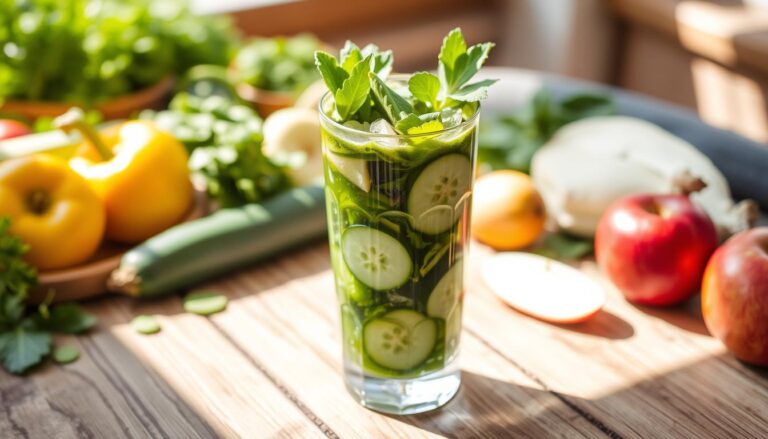Are you ready to unlock the power of ginger and transform your health? Ginger, the unassuming root, has been revered for centuries. It’s known for its remarkable health benefits. From aiding digestion to fighting infections, this versatile ingredient deserves a spot in your daily routine.
But just how powerful is ginger, and what can it do for your body? Let’s dive in and explore the fascinating world of this spice that’s anything but ordinary.
Key Takeaways
- Ginger contains compounds like gingerol and shogaol that offer a range of health benefits.
- Regular ginger consumption can aid digestion, reduce inflammation, and even help manage blood sugar levels.
- Ginger comes in various forms, from fresh root to powdered supplements, each with its own unique properties.
- Moderation is key when incorporating ginger into your diet, as excessive intake can lead to side effects.
- Ginger’s anti-inflammatory and antioxidant properties make it a potential natural remedy for various health concerns.
What Is Ginger Good For?
Ginger is a versatile and potent spice with many health benefits. It helps relieve nausea and reduces inflammation. This aromatic root has been used for centuries to promote overall well-being.
Health Benefits of Ginger
Ginger contains over 400 natural compounds, some of which are believed to have anti-inflammatory properties. This makes ginger a potential treatment for conditions like rheumatoid arthritis and respiratory inflammation. Studies suggest ginger may also reduce pain and disability in people with osteoarthritis.
Beyond its anti-inflammatory effects, ginger has been shown to exhibit antimicrobial properties. It is effective against bacterial and fungal infections, such as Staphylococcus aureus and Candida albicans. Compounds in ginger may even have anticancer properties and could potentially reduce the risk of gastrointestinal cancers.
Nausea Relief
One of ginger’s most well-known benefits is its ability to alleviate nausea. Numerous studies have found that ginger is highly effective against nausea caused by chemotherapy, pregnancy, and other conditions. In fact, just 1 gram of ginger has been shown to significantly reduce nausea symptoms in pregnant women.
Ginger may also help with digestive issues like bloating and gas. It makes a valuable addition to your daily routine. Whether you’re dealing with occasional discomfort or a more chronic condition, incorporating ginger into your diet could provide much-needed relief.
Ginger Tea Benefits
Ginger tea is a healthy choice instead of sugary drinks. It’s made by steeping fresh ginger or using dried ginger powder. This tea helps with nausea, digestion, and boosts immunity.
How to Make Ginger Tea
Making ginger tea at home is simple. Here’s a quick recipe:
- Peel and thinly slice 1-2 inches of fresh ginger root.
- Place the ginger slices in a teapot or heatproof mug.
- Pour 8 ounces of freshly boiled water over the ginger.
- Steep for 10-15 minutes to allow the ginger’s active compounds to infuse the water.
- Strain the tea to remove the ginger pieces, if desired.
- Enjoy your ginger tea hot, adding a touch of honey or lemon for extra flavor.
For a quicker option, use dried ginger powder. Start with 1/2 to 1 teaspoon per 8 ounces of water and steep for 5-10 minutes.
| Ginger Tea Benefits | Ginger Tea Cautions |
|---|---|
|
|
Ginger tea is a great addition to your daily routine. But, drink it in moderation. Also, talk to a healthcare provider if you have health issues or take medications. Enjoy its flavor and health benefits!

Ginger Root vs Ginger Powder
Both fresh ginger root and ginger powder are packed with health benefits. Yet, they differ in their characteristics.
Fresh ginger root has a bold, zesty flavor. It’s great for adding a strong taste to your meals. You can keep it in the fridge for weeks or freeze it after peeling and chopping.
Ginger powder, on the other hand, lasts longer and is easy to use. You don’t need to peel or chop it.
Ginger paste is a convenient option. It keeps the fresh ginger flavor but lasts up to two months in the fridge or freezer.
Choosing between ginger root, ginger powder, or ginger paste depends on your taste and cooking needs. Adding any of these to your meals can bring many health benefits.
“Ginger can help prevent infections thanks to gingerol. This compound helps fight bacteria and speeds up healing. It’s good for treating infections like gingivitis and respiratory issues.”
What does ginger do if you eat it everyday?
Eating ginger every day can bring many health benefits. It’s known for its strong anti-inflammatory effects. This can help reduce body inflammation. It may also improve digestion, ease nausea, and lower cancer risks.
But, eating too much ginger can cause problems. It might lead to stomach pain, heartburn, and diarrhea. Experts say to limit ginger to 3-4 grams a day. Pregnant women should stick to 1 gram daily.
Potential Health Benefits of Eating Ginger Daily
- Reduces inflammation: Ginger’s compounds can lower inflammation. This may prevent heart disease and neurodegenerative diseases.
- Alleviates nausea: Ginger is great for reducing nausea. It’s especially helpful for pregnant women and those getting chemotherapy.
- Supports digestive health: Ginger can help the digestive system. It promotes healthy bowel movements and eases gas and bloating.
- Manages blood sugar: Studies show ginger can improve insulin sensitivity. It may also lower fasting blood sugar in type 2 diabetes patients.
- Aids in weight management: Ginger, especially in ginger water, can aid in weight loss. It helps feel full and regulates blood sugar.
While ginger offers many health benefits, talk to a doctor before adding it to your daily routine. This is especially true if you have health issues or take medication.

Should You Take a Ginger Supplement?
Experts say it’s best to get ginger from food and drinks, not supplements. The supplement world isn’t well-regulated. This makes it hard for people to know what they’re really getting.
Ginger supplements can be risky. They might make bleeding worse for those on blood thinners. They could also mess with blood sugar levels for people with diabetes.
Eating ginger in foods and drinks is safer and more effective. It’s low in calories, with just 4 calories per 2 teaspoons. It doesn’t have much in the way of vitamins or minerals.
Ginger Supplement Benefits and Risks
- Ginger supplements may provide concentrated doses of the root’s active compounds, but the supplement industry is not well-regulated.
- High doses of ginger supplements can increase the risk of bleeding for those on blood thinners and may affect blood sugar levels in people with diabetes.
- Most research on ginger has explored dosages ranging from 250 mg to 1 gram, taken between one and four times daily, often using high-dosage extracts.
- During pregnancy, it is recommended to consume less than 1,500 mg of ginger extract per day to manage nausea, as it is considered safe and does not pose an increased risk of pregnancy loss or other symptoms.
For most people, eating ginger in foods and drinks is safer and more effective. It’s a better way to enjoy the benefits of this versatile root.
“When taken orally, ginger was moderately effective and safe for treating inflammation associated with osteoarthritis.”
The FDA says it’s okay to eat up to 4 grams of ginger a day. But, always talk to a doctor before starting any new supplement. This is especially true if you have health issues or take medications.
How to Eat Ginger
Ginger is a versatile ingredient that can be enjoyed in many ways. You can use fresh grated or minced ginger root, ginger paste, or dry ginger powder. This flavorful spice can make both sweet and savory dishes better.
One favorite way to enjoy ginger is as pickled ginger, often eaten with sushi. It has a spicy-sweet taste that balances sweet fruits and adds depth to savory foods like lentils and stir-fries. Fresh ginger root gives a stronger flavor than powder, but both have health benefits.
- Add fresh grated ginger to your morning smoothie or oatmeal for an energizing start to the day.
- Incorporate ginger paste into marinades, dressings, and sauces for meat, fish, or roasted vegetables.
- Sprinkle ground ginger powder over baked goods like muffins, scones, and gingerbread cookies.
- Make a warm and comforting ginger tea by steeping sliced fresh ginger in hot water and adding a touch of honey.
- Whip up a batch of ginger-infused jam or syrup to drizzle over pancakes, waffles, or even savory dishes.
Whether you like the bold taste of fresh ginger or the ease of dried ginger, there are many ways to enjoy the health benefits and versatility of this wonder spice.
“Ginger’s anti-inflammatory properties make it a natural choice for promoting muscle recovery and reducing soreness after exercise.”
Ginger’s compounds, like gingerol, have been studied and proven to exhibit anticancer properties. They specifically target the root cause of certain cancers like breast cancer. Also, eating ginger daily can help regulate blood sugar levels, reduce heart disease risk, and boost immunity with its antimicrobial and antifungal benefits.
Ginger Side Effects
Ginger is usually safe for most people when eaten in normal amounts. But, taking large doses, like in supplements, can lead to side effects. It’s important to know about these ginger side effects and ginger safety to use it wisely.
High doses of ginger can affect blood clotting. This is a big concern for people taking blood-thinning meds. They might bleed more, so it’s key to talk to a doctor before using ginger supplements.
Ginger might also change blood sugar levels. This is a risk for people with diabetes. They should watch their blood sugar closely and talk to their doctor about using ginger supplements.
While ginger has many benefits, too much of it can cause problems. Eating more than 5 grams a day can lead to heartburn, diarrhea, and stomach pain.
The FDA doesn’t check dietary supplements like ginger as closely as medicines. This means it’s crucial to talk to a doctor before starting them.
“More than 60% of women in a study reported that ginger lessened pain associated with periods.”
In summary, ginger is usually safe in small amounts. But, knowing the ginger side effects, ginger safety, and ginger interactions is important. Always get advice from a healthcare professional, especially if you have health issues or take medicines.
| Study | Findings |
|---|---|
| Abdel Halim, 2008 | Detailed efficacy data on the effect of Zingiber officinale (ginger) on third stage larvae and adult fecundity of Musca domestica and Anopheles pharoensis. |
| Alzoreky and Nakahara, 2003 | Specific antibacterial activity results involving ginger among edible plants commonly consumed in Asia. |
| Horie et al., 2004 | Statistical details on the protective role of the vanilloid receptor type 1 in HCl-induced gastric mucosal lesions in rats. |
| Iqbal et al., 2006 | Statistical data on the in vivo anthelmintic activity of ginger against gastrointestinal nematodes of sheep. |
| Kamtchouing et al., 2002 | Specific data on the evaluation of androgenic activity of Zingiber officinale (ginger) in male rats. |
| Ippoushi et al., 2005 | Data related to the inhibition mechanism of peroxynitrite-induced oxidation and nitration by [6]-gingerol. |
| Lohsiriwat et al., 2010 | Statistical results on the effect of ginger on lower esophageal sphincter pressure. |
| Lumb, 1994 | Statistical data on the effect of dried ginger on human platelet function. |
| Mahady et al., 2005 | Specific statistical results on ginger’s effectiveness in in vitro susceptibility of Helicobacter pylori to botanical extracts used traditionally. |
Anti-Inflammatory Power of Ginger
Ginger is a root used in cooking and medicine. It has many health benefits. Its anti-inflammatory properties are especially useful for ginger arthritis and ginger inflammation.
Ginger’s power comes from a compound called gingerol. This molecule is known for reducing inflammation and pain. Studies show ginger can be a natural cure for ginger anti-inflammatory issues, including:
- Osteoarthritis: Ginger can lessen pain and disability in this common arthritis.
- Muscle soreness: It helps reduce muscle pain after hard workouts.
- Digestive issues: Ginger soothes stomach problems like indigestion and irritable bowel syndrome.
The exact hows are still being studied. But, ginger seems to be a natural way to fight inflammation. It might become a key part in fighting many inflammatory diseases.
“Ginger is a remarkable natural compound that can offer significant relief for individuals struggling with inflammatory conditions. Its anti-inflammatory and antioxidant properties make it a promising alternative to traditional medications.”

Before adding ginger to your diet, talk to a doctor. This is especially true if you have health issues or take medicine. With the right advice, ginger can help improve your health and life quality.
Ginger for Weight Loss and Blood Sugar Control
Ginger is a powerful ally for your health. Studies have shown its benefits, especially for weight management and blood sugar control.
Ginger for Weight Loss
Research shows ginger can help with weight loss. It reduces body weight and waist-hip ratio in overweight people. Ginger’s anti-inflammatory properties may support healthy metabolism and weight control.
Ginger and Blood Sugar Control
Ginger is also good for blood sugar control. It improves insulin sensitivity and lowers fasting blood sugar in type 2 diabetes patients. This is great news for diabetes care.
| Study | Findings |
|---|---|
| Li et al. (2012) | Gingerols from Zingiber officinale enhanced glucose uptake by increasing cell surface GLUT4 in cultured L6 myotubes. |
| Esteghamati et al. (2008) | The prevalence rate of diabetes and impaired fasting glucose in the adult population of Iran was 31%. |
| Madkor et al. (2011) | A mixture of garlic, ginger, and turmeric had modulatory effects on hyperglycemia, dyslipidemia, and oxidative stress in streptozotocin-nicotinamide diabetic rats. |
| Al-Amin et al. (2006) | Ginger demonstrated anti-diabetic and hypolipidemic properties in streptozotocin-induced diabetic rats. |
While more research is needed, ginger seems to help with weight and blood sugar. Always talk to your doctor before adding new supplements to your diet.
Ginger’s Potential Anticancer Properties
Ginger is more than just a spice with a unique taste and smell. It has antioxidant and anti-inflammatory properties that might help fight cancer. Research has shown ginger’s compounds, like gingerol, could lower cancer risks. This includes cancers of the colon, pancreas, and liver.
The science behind ginger’s cancer-fighting abilities is still being studied. But early findings suggest its antioxidant and anti-inflammatory compounds are key. These compounds can reduce inflammation, stop cancer cell growth, and even kill cancer cells. All these actions are important in stopping tumors from growing.
Ginger’s benefits might not stop at just fighting cancer cells. It could also help with non-alcoholic fatty liver disease. This condition is linked to liver cancer. Studies found that ginger can lower liver damage markers and insulin resistance in people with this disease.
More research is needed to fully grasp ginger’s cancer-fighting powers. But the early results are encouraging. Ginger’s strong antioxidant and anti-inflammatory effects make it a promising natural remedy for cancer prevention and treatment.
“Ginger has demonstrated the ability to suppress proinflammatory cytokines and inflammatory genes, which are crucial factors in tumor development.”

The study of ginger’s anticancer properties is an exciting area of research. As scientists learn more, ginger could play a big role in the fight against cancer.
Conclusion
Ginger is a powerhouse of health benefits, with a history dating back to the 9th century. It can soothe nausea and digestive issues. It also has anti-inflammatory, antioxidant, and anticancer properties.
This versatile root can be a great addition to your wellness routine. You can enjoy it in teas, add it to food, or take it as a supplement. Ginger offers a tasty way to improve your health.
But, it’s important to use ginger in moderation. Always talk to a healthcare professional, especially if you have health conditions or take medications. Ginger can interact with drugs and cause side effects like stomach pain and heartburn.
The ginger benefits, ginger nutrition, and ginger health make it worth trying. By adding ginger to your daily life safely and enjoyably, you can start a journey to better well-being. So, let ginger inspire your cooking and wellness adventures.





